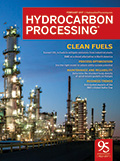
February 2017
Special Focus: Clean Fuels
In Part 1 of this article, economic incentives were estimated for relaxing the requirement that biocrude entering the refinery infrastructure be oxygen (O2)-free. It was concluded that an accurate estimate of these incentives is not possible without a significant amount of additional data. Part 2 examines key issues that must be addressed and the associated data needed for this constraint to be relaxed.
Common organic contaminants of Claus sulfur recovery unit (SRU) acid gas (AG) feed include: heavy hydrocarbons, in general; benzene, toluene, ethylbenzene and xylene (BTEX), in particular; and methanol (CH3OH).
Major trends in the global hydrocarbon processing industry include the regulatory-driven demand for clean, low-emissions fuels. Two decades of global efforts have shown that dimethyl ether (DME) can satisfy these drivers.
An economical commercial process is necessary to provide an incentive for the utility industries to engender win-win support for government regulations on carbon dioxide (CO2) emissions.
Process Optimization
Steam cracking furnaces produce olefins, which are high-value feeds in the petrochemical industry. Coke formation is an unavoidable part of a thermal cracking furnace.
Although we have entered a new era of low energy prices, energy still represents one of the largest, but most easily managed, operating costs in the hydrocarbon industries.
Process unit revamps often do not result in a refiner achieving its desired objectives. This is typically not the result of mechanical defects with process equipment.
Maintenance and Reliability
The use of spiral-wound gaskets on flanges has resulted in good sealing performance. However, most gaskets do not perform well when the flange is improperly installed.
Skid-mounted units are omnipresent in the hydrocarbon processing industry (HPI), as facilities are scattered in remote locations, and site construction is time-consuming and expensive. Skid units are equally popular in downstream refineries and the chemical processing industry (CPI).
In the processing industries, companies rely on their physical assets to guarantee that they are always producing at the same capacity, or preferably higher, than they began. To achieve these high levels of production, assets must be readily available.
While equipment reliability is not a new concept in hydrocarbon processing facilities, it is increasingly becoming the top priority for plant managers. Plant managers realize that operational efficiency is far from being a passing trend, and is closely linked to the quality and reliability of the equipment used.
Environment and Safety
Process safety cannot be ensured solely by design, as it relies on the effective operability of safety and control components. Effective operability is influenced by factors that include the condition of components and operational practices.
Columns
Each year, <sub>Hydrocarbon Processing</sub> devotes an issue to the topic of clean fuels—and rightly so. As the world continues to welcome more vehicles on the road, and as emerging economies invest in civil, industrial and energy projects, global fuels demand is forecast to increase through the end of the decade.
At a recent conference attended by failure investigation professionals in San Antonio, Texas, a participant spoke about an explosion and fire event on a multistage horizontally opposed compressor in oxygen (O2) service. He had scant data, but he knew the machine did not have cylinder lubrication.
Major suppliers are expanding their automation-related service capabilities from project and engineering services through services for operations and maintenance. This is happening partly in response to overall automation market conditions, but largely in response to evolving user challenges and requirements.
Unloved and increasingly unneeded, Europe’s oil refining sector has been under duress for an astonishing four decades.
India is the seventh-largest country in the world by land mass. Urbanization is taking place at a rapid pace: According to the country’s 2011 census, more than 377 MM Indians live in nearly 8,000 towns and cities. This count represents more than 31% of the country’s total population.
Trends and Resources
According to OPEC’s World Oil Outlook 2016, desulfurization capacity additions represent the largest capacity increases among all process units to 2040. This trend is due to increased regulations on the amount of sulfur allowed in transportation fuels.
In October 2016, the International Maritime Organization (IMO) announced that it will implement a new regulation that calls for the sulfur content in marine fuels to be reduced from 3.5% to 0.5%. The new regulation will go into effect in January 2020. This action by the IMO will have a profound impact on the maritime and refining industries worldwide, as well as on the environment. This month’s Business Trends section provides an overview on the anticipated impacts of the IMO’s decision on petroleum product markets.
European refinery margins weakened due to slower gasoline export opportunities, despite the colder weather.
According to Hydrocarbon Processing’s Construction Boxscore Database, new project announcements have averaged 11 per month since mid-2016.
Siemens Water Solutions has chosen a ceramic flat-sheet membrane for use in a powdered activated carbon technology (PACT) membrane bioreactor (MBR).
Linde Engineering North America Inc. has appointed Jason Cooper as the company’s President and CEO.

- SkyNRG starts construction on its first SAF plant in Delfzijl, the Netherlands 2/13
- India's Reliance wins U.S. license for Venezuelan oil 2/13
- Singapore light distillates stocks hit over 3-yr high on robust imports 2/13
- Three contractors injured at ExxonMobil facility in Beaumont, Texas (U.S.) 2/13
- China's epic renewables boom lifts it into rare clean capacity club 2/13
- TotalEnergies booked loss in France due to refining activities, CEO says 2/13




